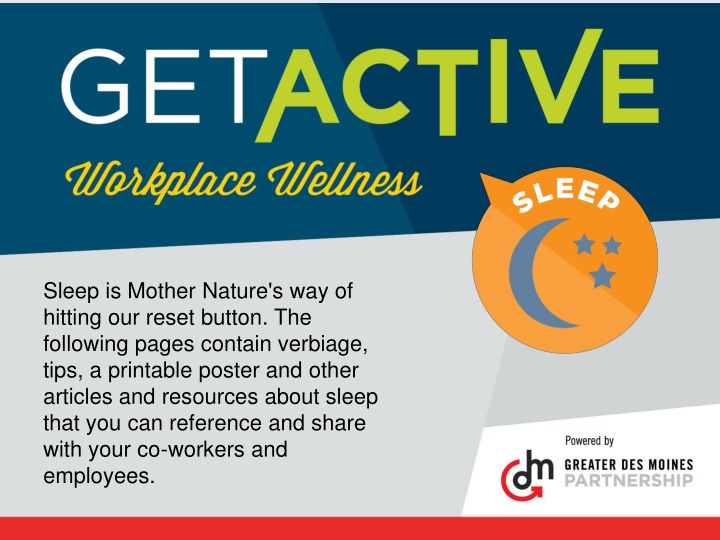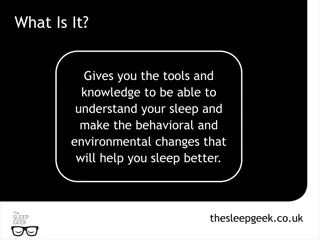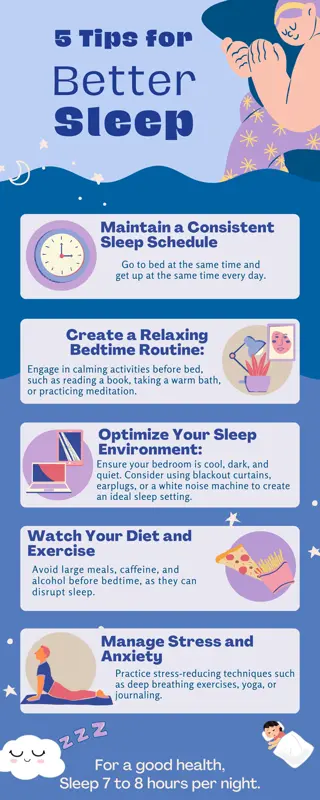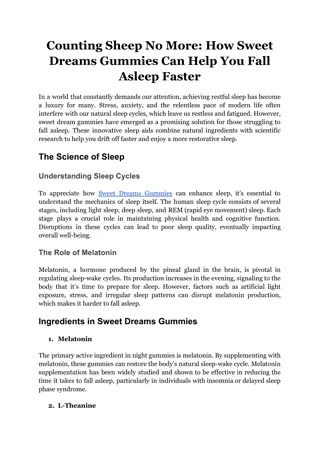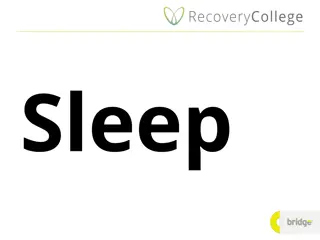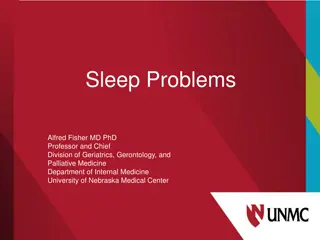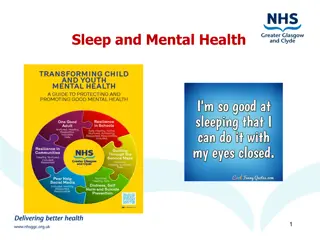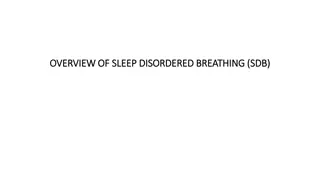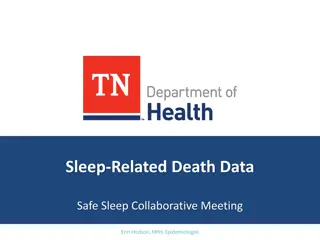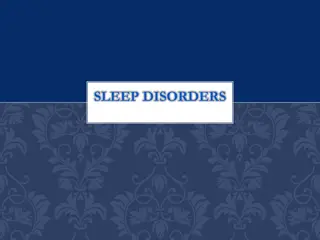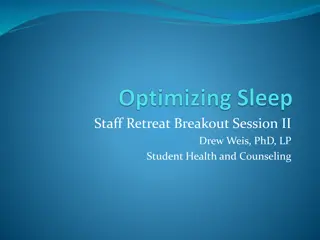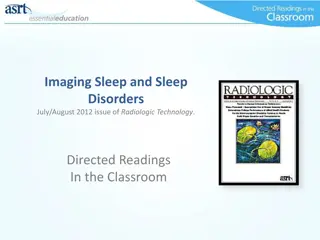Importance of Sleep and Tips for Better Sleep Habits
Americans often sacrifice sleep in pursuit of work-life balance, but lack of sleep can negatively impact health and productivity. This article discusses the importance of adequate sleep for overall well-being and offers practical tips for improving sleep quality, including keeping a sleep diary, maintaining a consistent sleep schedule, engaging in relaxing activities before bed, and avoiding disruptions during the night. Additional resources and tips for better sleep are also provided.
Download Presentation

Please find below an Image/Link to download the presentation.
The content on the website is provided AS IS for your information and personal use only. It may not be sold, licensed, or shared on other websites without obtaining consent from the author.If you encounter any issues during the download, it is possible that the publisher has removed the file from their server.
You are allowed to download the files provided on this website for personal or commercial use, subject to the condition that they are used lawfully. All files are the property of their respective owners.
The content on the website is provided AS IS for your information and personal use only. It may not be sold, licensed, or shared on other websites without obtaining consent from the author.
E N D
Presentation Transcript
Sleep is Mother Nature's way of hitting our reset button. The following pages contain verbiage, tips, a printable poster and other articles and resources about sleep that you can reference and share with your co-workers and employees.
WHAT AND WHY As Americans work extended hours, routinely take work home, and strive for that elusive work-life balance, sleep has become a casualty of the race for time. But lack of sleep undermines our ability to focus, to be productive, and even impacts our memory. Sleep also plays an important role in our physical health. Sleep is involved with healing and repairing our cardiovascular system. Long-term sleep deficiency can lead to increased risk of heart disease, kidney disease, high blood pressure, diabetes and stroke. Taking time to rest and getting sufficient sleep is essential for a happy and productive life. This month, let's examine ways we can add a few more minutes of sleep into our lives.
IDEAS FOR ACTIVITIES Keep a Sleep Diary A very helpful tool to track your sleep time and patterns is a sleep diary. It includes the time you go to bed, the time you wake up, your total hours of sleep, and whether you had any nighttime awakenings (and if so, how long you were awake) and any daytime naps. Note how you feel when you are awake (refreshed or tired), and how you feel at different times of the day will enable you to become more aware of your patterns, and help you determine if you are getting adequate sleep. Take a Sleep Vacation If you continue going to bed at the same time and allowing your body to wake up naturally, you will eventually establish a pattern of sleeping essentially the same amount of time each night, probably in the range of 7 to 9 hours.
IDEAS FOR ACTIVITIES Don t Be A Nighttime Clock-Watcher If you wake up in the middle of the night and can t get back to sleep in about 20 minutes, get up and engage in a quiet, restful activity such as reading or listening to music. And keep the lights dim. Bright light can stimulate your internal clock. When your eyelids are drooping and you are ready to sleep, return to bed. Lighten Up on Evening Meals Finish dinner several hours before bedtime and avoid foods that cause indigestion. If you get hungry at night, snack on foods that (in your experience) won't disturb your sleep, perhaps dairy foods and carbohydrates. Establish a Soothing Pre-Sleep Routine Take a bath (the rise, then fall in body temperature promotes drowsiness), read a book, watch television, or practice relaxation exercises. Avoid stressful, stimulating activities.
RESOURCES Articles 11 Unconventional Sleep Tips: How to Get to Sleep and Stay Asleep How Lack of Sleep Hurts Your Health Videos How Much Sleep Do You Need? Honor Thy Sleep
25 TIPS 1. Practice a relaxing bedtime ritual. A relaxing, routine activity right before bedtime conducted away from bright lights helps separate your sleep time from activities that can cause excitement, stress or anxiety which can make it more difficult to fall asleep, get sound and deep sleep or remain asleep. If you have trouble sleeping, avoid naps, especially in the afternoon. Power napping may help you get through the day, but if you find that you can't fall asleep at bedtime, eliminating even short catnaps may help. Exercise daily. Vigorous exercise is best, but even light exercise is better than no activity. Exercise at any time of day, but not at the expense of your sleep. Design your sleep environment to establish the conditions you need for sleep. Your bedroom should be cool between 60 and 67 degrees. Sleep on a comfortable mattress and pillows. Make sure your mattress is comfortable and supportive. Have comfortable pillows and make the room attractive and inviting for sleep but also free of allergens that might affect you and objects that might cause you to slip or fall if you have to get up. 2. 3. 4. 5.
MORE TIPS 6. Avoid bright light in the evening and expose yourself to sunlight in the morning. This will keep your circadian rhythms in check. If you can, avoid eating large meals for two to three hours before bedtime. Try a light snack 45 minutes before bed if you re still hungry. Your body needs time to shift into sleep mode, so spend the last hour before bed doing a calming activity such as reading. If you can't sleep, go into another room and do something relaxing until you feel tired. It is best to take work materials, computers and televisions out of the sleeping environment 10. Drink enough fluid at night to keep from waking up thirsty, but not so much and so close to bedtime that you will be awakened by the need for a trip to the bathroom. 11. Try to finish exercising at least three hours before bed or workout earlier in the day. 7. 8. 9.
MORE TIPS 12. Buy an alarm clock. And keep your phone in the other room. Smartphones can represent a source of stress during the day, and proximity to the bed can disrupt sleep even if it doesn t make noise or is set to vibrate. 13. Want to sleep well? Start your day with omega-3s! These healthy fats lower anxiety and help your body produce the hormones you need to sleep at night. 14. Keep regular hours. Going to bed and getting up at roughly the same time, all the time, will program your body to sleep better. 15. Cut down on stimulants such as caffeine in tea or coffee especially in the evening. They interfere with falling asleep and prevent deep sleep. Have a hot milky drink or herbal tea instead. 16. Take time to wind down before bed. In the first 20 minutes, prep for tomorrow (pack your work bag, pick out clothes). In the next 20 minutes, take care of personal hygiene and in the last 20 minutes, relax in bed with reading material. 17. The ideal nighttime snack combines carbohydrates and either calcium or a protein to boost serotonin, so snack on some cheese and crackers.
MORE TIPS 18. Try a hot bath or shower. Stepping from warm water into that pre-cooled bedroom will cause body temperatures to drop slightly, which can trigger sleepy feelings by slowing down metabolic activity. 19. Regular physical activity can promote better sleep, helping you to fall asleep faster and to enjoy deeper sleep. 20. Increasing natural light exposure during the day promotes healthy melatonin balance, which can help us get to sleep later in the day. 21. One surefire way to fight your fatigue is to ban the snooze button. You've decided what time you are going to get up every day and that does not mean 15 minutes early and snoozing until it's time to get out of bed. 22. The scent of lavender has noted benefits for sleep. 23. Getting some natural light you'll want to aim for about 15 minutes first thing in the morning can help night owls reset their biological clocks and ease into sleep a little earlier.
MORE TIPS 24. Too little sleep can slow memory, learning and cognitive abilities, including critical thinking, math skills and spatial orientation. 25. If you re not asleep after 20 minutes, get out of bed, go to another room, and do something relaxing; like reading or listening to music until you are tired enough to sleep. 26. Skimping on shut-eye can hurt your ability to fight off colds, flu and other infections and affect your response to vaccinations.
APPENDIX We can t take all of the credit. In compiling this information, we referenced the following organizations and websites: sleepfoundation.org bettersleep.org doctoroz.com sleepcouncil.com prevention.com greatlist.com huffingtonpost.com health.com longevity.about.com allyou.com healthysleep.com harvard.edu hwww.nih.gov
